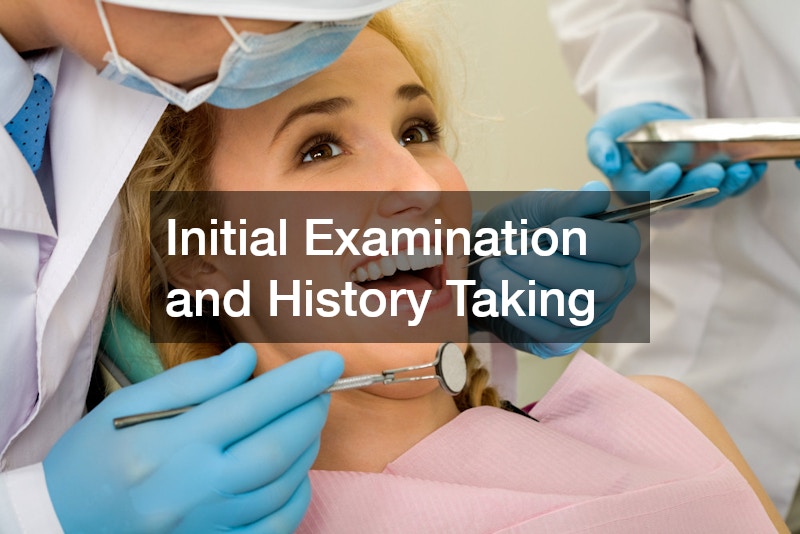Oral health is a cornerstone of overall well-being, impacting not only the mouth but our entire body. Ensuring healthy teeth and gums requires consistent attention and professional intervention. Regular dental services remain a vital aspect of maintaining optimal oral health throughout one’s life, providing preventative measures, early detection, and continuous upkeep.
Prevention and Early Detection
Regular dental check-ups play a crucial role in preventing oral diseases by identifying early signs of decay or gum disease. Dentists can spot problems invisible to the untrained eye, such as cavities below the gum line or early signs of oral cancer.
These early detections not only prevent the progression of diseases but also save individuals from more complex treatments in the future.
Visiting the dentist regularly ensures that any developing issues are addressed before they become severe. For example, identifying and treating periodontal disease in its initial stages can prevent tooth loss and further complications. The proactive approach of regular dental visits often involves the use of advanced diagnostic tools that enhance early detection capabilities.
Professional Cleaning and Maintenance
Professional cleaning services reach areas that regular brushing and flossing might miss, such as below the gum line and the back of the molars. Dentists and hygienists have the tools and expertise to remove built-up plaque and tartar effectively. This thorough cleaning not only keeps the teeth looking their best but also plays a significant role in preventing gum disease.
Regular cleaning appointments also provide an opportunity for hygienists to teach proper brushing and flossing techniques. This personalized instruction can enhance an individual’s daily oral hygiene routine, making it more effective. Maintaining oral health means not only addressing current issues but also equipping individuals with the knowledge to prevent future problems.
Personalized Oral Care Advice
Each individual’s oral health needs are unique, making personalized advice from dental professionals invaluable. During dental visits, professionals evaluate factors such as diet, habits, and medical history to tailor recommendations. This customized guidance helps individuals manage specific concerns like sensitivity, bad breath, or recurrent cavities more effectively.
Personalized advice is not just about addressing immediate issues; it’s about crafting a long-term plan for optimal oral health. Dentists can provide insights on the best products and techniques suited to individual oral care needs, from toothbrush types to special mouthwashes. This individualized approach supports sustained oral health improvements beyond the dental office.
The Connection Between Oral and Systemic Health
The mouth is a gateway to the rest of the body, and oral health significantly impacts systemic health. Conditions such as gingivitis and periodontitis have been linked to heart disease, diabetes, and even stroke. Regular dental services help mitigate these risks by maintaining oral wellness, thus supporting overall health.
Inflammation from oral infections can enter the bloodstream, affecting distant parts of the body and exacerbating systemic conditions. Professional dental intervention helps manage these inflammatory processes early, reducing their potential impact on broader health issues. Understanding the mouth-body connection underscores the importance of routine dental visits.
Mental and Social Benefits
Good oral health contributes significantly to mental well-being by fostering confidence and self-esteem. A healthy, bright smile is often associated with greater social acceptability, opening opportunities for positive interpersonal interactions. Reduced oral pain and discomfort further contribute to a more positive outlook and improved quality of life.
Oral health problems, such as missing teeth or bad breath, can lead to social discomfort and isolation. Regular dental services address these concerns by maintaining an aesthetically pleasing and healthy oral environment. The resulting confidence from a maintained smile positively influences personal and professional interactions.
Initial Examination and History Taking
A thorough initial examination forms the foundation of any dental visit, starting with a comprehensive medical history review. Understanding the patient’s overall health and lifestyle helps dentists customize care plans and anticipate any potential complications. This patient-dentist conversation sets the stage for a holistic approach to oral health care.
The visual inspection involves examining teeth and gums for any signs of decay, disease, or abnormalities. Analyzing the bite and jaw structure also forms part of this comprehensive assessment. This process is crucial for establishing a baseline of oral health and detecting any divergences from it over time.
Diagnostic Tests and Procedures
Dental visits often include diagnostic tests such as X-rays to uncover hidden problems that are not visible through a standard examination. X-rays can pinpoint issues like impacted teeth, jawbone damage, or tooth decay under existing fillings. Early diagnosis through imaging ensures conditions are addressed promptly and appropriately.
Diagnostic procedures might also include oral cancer screenings, especially important for identifying possible cancerous lesions early. These screenings often involve a simple visual examination and may include additional tools to detect abnormalities. Regular screenings can significantly enhance the prognosis if any concerning tissues are found early.
Planning and Implementation of Treatment
Following thorough examinations and diagnostics, dentists create a detailed treatment plan tailored to the patient’s specific needs. This plan addresses both current issues and outlines preventive measures to avoid future problems. Collaborative planning ensures patients understand their condition and participate in an informed decision-making process for their care.
Regular dental services serve as a crucial foundation for lifelong oral health, offering prevention, early detection, and tailored professional care. These services contribute not only to oral wellness but also impact overall physical, mental, and social health. Emphasizing regular dental visits is essential to manage, prevent, and maintain optimal oral health and general well-being throughout an individual’s life.
Oral health is a cornerstone of overall well-being, impacting not only the mouth but our entire body. Ensuring healthy teeth and gums requires consistent attention and professional intervention. Regular dental services remain a vital aspect of maintaining optimal oral health throughout one’s life, providing preventative measures, early detection, and continuous upkeep.
Prevention and Early Detection
Regular dental check-ups play a crucial role in preventing oral diseases by identifying early signs of decay or gum disease. Dentists can spot problems invisible to the untrained eye, such as cavities below the gum line or early signs of oral cancer.
These early detections not only prevent the progression of diseases but also save individuals from more complex treatments in the future.
Visiting the dentist regularly ensures that any developing issues are addressed before they become severe. For example, identifying and treating periodontal disease in its initial stages can prevent tooth loss and further complications. The proactive approach of regular dental visits often involves the use of advanced diagnostic tools that enhance early detection capabilities.
Professional Cleaning and Maintenance
Professional cleaning services reach areas that regular brushing and flossing might miss, such as below the gum line and the back of the molars. Dentists and hygienists have the tools and expertise to remove built-up plaque and tartar effectively. This thorough cleaning not only keeps the teeth looking their best but also plays a significant role in preventing gum disease.
Regular cleaning appointments also provide an opportunity for hygienists to teach proper brushing and flossing techniques. This personalized instruction can enhance an individual’s daily oral hygiene routine, making it more effective. Maintaining oral health means not only addressing current issues but also equipping individuals with the knowledge to prevent future problems.
Personalized Oral Care Advice
Each individual’s oral health needs are unique, making personalized advice from dental professionals invaluable. During dental visits, professionals evaluate factors such as diet, habits, and medical history to tailor recommendations. This customized guidance helps individuals manage specific concerns like sensitivity, bad breath, or recurrent cavities more effectively.
Personalized advice is not just about addressing immediate issues; it’s about crafting a long-term plan for optimal oral health. Dentists can provide insights on the best products and techniques suited to individual oral care needs, from toothbrush types to special mouthwashes. This individualized approach supports sustained oral health improvements beyond the dental office.
The Connection Between Oral and Systemic Health
The mouth is a gateway to the rest of the body, and oral health significantly impacts systemic health. Conditions such as gingivitis and periodontitis have been linked to heart disease, diabetes, and even stroke. Regular dental services help mitigate these risks by maintaining oral wellness, thus supporting overall health.
Inflammation from oral infections can enter the bloodstream, affecting distant parts of the body and exacerbating systemic conditions. Professional dental intervention helps manage these inflammatory processes early, reducing their potential impact on broader health issues. Understanding the mouth-body connection underscores the importance of routine dental visits.
Mental and Social Benefits
Good oral health contributes significantly to mental well-being by fostering confidence and self-esteem. A healthy, bright smile is often associated with greater social acceptability, opening opportunities for positive interpersonal interactions. Reduced oral pain and discomfort further contribute to a more positive outlook and improved quality of life.
Oral health problems, such as missing teeth or bad breath, can lead to social discomfort and isolation. Regular dental services address these concerns by maintaining an aesthetically pleasing and healthy oral environment. The resulting confidence from a maintained smile positively influences personal and professional interactions.
Initial Examination and History Taking
A thorough initial examination forms the foundation of any dental visit, starting with a comprehensive medical history review. Understanding the patient’s overall health and lifestyle helps dentists customize care plans and anticipate any potential complications. This patient-dentist conversation sets the stage for a holistic approach to oral health care.
The visual inspection involves examining teeth and gums for any signs of decay, disease, or abnormalities. Analyzing the bite and jaw structure also forms part of this comprehensive assessment. This process is crucial for establishing a baseline of oral health and detecting any divergences from it over time.
Diagnostic Tests and Procedures
Dental visits often include diagnostic tests such as X-rays to uncover hidden problems that are not visible through a standard examination. X-rays can pinpoint issues like impacted teeth, jawbone damage, or tooth decay under existing fillings. Early diagnosis through imaging ensures conditions are addressed promptly and appropriately.
Diagnostic procedures might also include oral cancer screenings, especially important for identifying possible cancerous lesions early. These screenings often involve a simple visual examination and may include additional tools to detect abnormalities. Regular screenings can significantly enhance the prognosis if any concerning tissues are found early.
Planning and Implementation of Treatment
Following thorough examinations and diagnostics, dentists create a detailed treatment plan tailored to the patient’s specific needs. This plan addresses both current issues and outlines preventive measures to avoid future problems. Collaborative planning ensures patients understand their condition and participate in an informed decision-making process for their care.
Regular dental services serve as a crucial foundation for lifelong oral health, offering prevention, early detection, and tailored professional care. These services contribute not only to oral wellness but also impact overall physical, mental, and social health. Emphasizing regular dental visits is essential to manage, prevent, and maintain optimal oral health and general well-being throughout an individual’s life.



